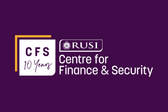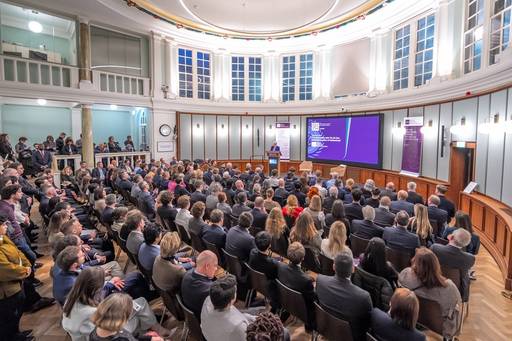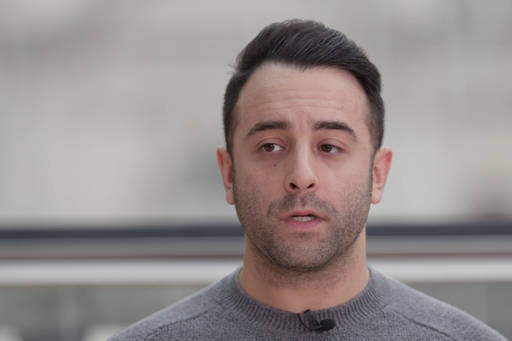Our analysis and actionable ideas aim to challenge the status quo and build resilience in the global response to illicit finance. Our work covers a range of state- and non-state-based security threats, which we examine through a financial lens across two primary areas:
- Financial Crime Policy: focusing on the development and implementation of effective anti-financial crime policies and regulation both in the UK and internationally; as well as engaging with global policy bodies such as the FATF and UNCAC.
- Sanctions, State Threats and Economic Security: examining the financial dimension of state threats and the weaponisation of finance as a tool of international statecraft in an increasingly fragmented geopolitical landscape, through the analysis of evolving trends and responses such as sanctions and the expanding focus on economic security.
Since the centre’s inception in 2014, the world of finance and security has expanded and become more complex. Terrorist financing has become tech-enabled, fraud and money laundering are more organised and transnational, the advance of cryptocurrencies has unlocked a new dimension for illicit finance, and the financial dimension of state threats is becoming more prominent at a time of fragmenting geopolitics.
Alongside our evidence-based research that provides solutions to some of the biggest challenges in the finance and security landscape, CFS also has a unique ability to convene policymakers, industry leaders, academics, and experts. This allows them to develop new networks and bring fresh perspectives to the key finance and security issues that the world is currently facing.
CFS experts are regularly called on to advise governments and international bodies, including the UN Security Council, the Financial Action Task Force, the UK and European Parliaments, and US Congress. Through our public engagements and events, we aim to highlight to wider audiences the pivotal role of finance in global security; and put our evidence-based research into practice through capacity-building and collaborative workshops.

Watch the session recordings from our inaugural conference hosting policymakers, law enforcement and private sector representatives to discuss how to tackle rising financial crime threats, make sanctions more effective, and create solutions that integrate responses to economic crime and illicit finance into the security landscape.
Programmes
The Centre for Finance and Security splits its research into two programmes:
Financial Crime Policy
This programme focuses on the development and implementation of effective anti-financial crime policies and regulation both in the UK and internationally.
Sanctions, State Threats and Economic Security
This programme focuses on sanctions, economic security, and the financial dimension of state threats.
Taskforces
Nothing exemplifies our work combining research and convening as well as the range of taskforces we have run at the CFS over the years. For us, they offer the ideal platform for developing new approaches to address pressing policy issues and bringing those ideas to governments and the private sector in a timely fashion.
For topics that are fast-moving like the development of Russia’s shadow fleet to support its export of oil to fund its war in Ukraine, time is of the essence; or our work on the integrity of the financial system in Ukraine where our public-private sector taskforce can be nimble in addressing topics that are at the front-of-mind as Kyiv battles to negotiate both war and policymaking on topics that matter to its future.
Whether we focus on state threats, maritime or cyber sanctions, the financial integrity of Ukraine, or the evaluation of the UK by the global financial crime watchdog the Financial Action Task Force, we find that gathering expertise in this way creates an ideal platform for impact.
Our taskforces don’t only work for us. They also attract external attention – high-level visitors to London and Brussels from around the world ask to meet with us; the scrutiny our taskforces bring ensures policymakers are keen to engage with us; and ultimately the diverse expertise of taskforce members ensure that the outcomes and recommendations of our taskforces are sharp and impactful.
These groups also work for our supporters who find them a great way of engaging with our work on topics that matter to them.
We are always looking for supporters for these collaborative efforts, so get in touch if you think this is the sort of initiative you would like to help succeed.

Supporting the UK in its preparations for its next mutual evaluation by the Financial Action Task Force (FATF).

Supporting the UK in strengthening the effective implementation and enforcement of sanctions and advancing a coherent future sanctions strategy.

Examining the challenges facing the implementation and enforcement of maritime sanctions and aim to identify opportunities to improve their effectiveness.

Examining how cyber sanctions can more effectively deter state-sponsored operations and disrupt the infrastructure that supports cybercrime.

Supporting the European Commission, EU member states, and key allies by bringing clarity to the policy dialogue on economic security.
Join our network
Support our work, join our CFS Partnership Forum and subscribe to our newsletter to stay up to date with our latest research.

Our partnership forum enables you to stay on the pulse of the latest policy and research developments, helping to inform your decision-making through unique insights, knowledge development and networking opportunities.

Launched by RUSI’s Centre for Finance and Security (CFS), the Forum aims at bringing together early career professionals from the public and private sector to intensify their presence and influence in the field.

Join us in disrupting the cycle of illicit finance and in creating a more secure and inclusive world. Make a one-off or recurring gift to help fund our CFS research programmes.
Our team
Tom Keatinge
Director, CFS
Centre for Finance and Security
Kinga Redlowska
Head of CFS Europe
Centre for Finance and Security
Robert Rogers
Finance, Bids and Grants Manager, CFS
Centre for Finance and Security
Kirsten Thompson
Business Development and Partnerships Manager, CFS
Centre for Finance and Security
Michelle Houghton
Programme Manager
Centre for Finance and Security
Eliza Lockhart
Research Fellow
Centre for Finance and Security
Gonzalo Saiz Erausquin
Research Fellow
Centre for Finance and Security
Arzu Abbasova
Research Analyst
Centre for Finance and Security
Oksana Ihnatenko
Researcher for project SMURF, CFS
Centre for Finance and Security
Wojciech Pawlus
Head of Countering Proliferation Financing Programme
Centre for Finance and Security
Georgia Jones
Research Analyst/Project Officer, CFS
Centre for Finance and Security
Marta Popyk
Research Analyst and Project Officer, CFS
Centre for Finance and Security
Dr Daryna Dvornichenko
Russia Sanctions Programme Manager, CFS
Centre for Finance and Security
Irina Mamulashvili
Russia Sanctions Implementation Project Officer
Centre for Finance and Security
Fellows
Olivia Allison
RUSI Associate Fellow, CFS
Vito Armonavicius
RUSI Associate Fellow, CFS
Dr Aaron Arnold
RUSI Senior Associate Fellow, CFS
Centre for Finance and Security
David Artingstall
RUSI Associate Fellow, CFS
Karen Baxter
RUSI Senior Associate Fellow, CFS
Jonathan Benson
RUSI Senior Associate Fellow, CFS
Dr Katie Benson
RUSI Associate Fellow, CFS | SHOC Network Member - Researcher
Dr Anna Bradshaw
RUSI Associate Fellow, CFS
David Carlisle
RUSI Associate Fellow, CFS
Isabella Chase
RUSI Associate Fellow, CFS
Chloe Cina
RUSI Senior Associate, CFS
Emil Dall
RUSI Associate Fellow, CFS
Jessica Davis
RUSI Associate Fellow, CFS
Gregory Dellas
RUSI Associate Fellow, CFS
Veronica Dragalin
RUSI Associate Fellow, CFS
Jan Dunin-Wasowicz
RUSI Associate Fellow, CFS
Dara Fernandez
RUSI Associate Fellow, CFS
Edmund Fitton-Brown
RUSI Senior Associate Fellow, CFS
James Gillespie
RUSI Associate Fellow, CFS
Ashlee Godwin
RUSI Associate Fellow, CFS; Proliferation and Nuclear Policy
Justyna Gudzowska
RUSI Associate Fellow, CFS
Dr Ashley Hess
RUSI Associate Fellow, CFS
Kayla Izenman
RUSI Associate Fellow, CFS
Anagha Joshi
RUSI Associate Fellow, CFS
Xolisile Khanyile
RUSI Senior Associate Fellow, CFS
Olivier Kraft
RUSI Associate Fellow, CFS
Olivia Kearney
RUSI Associate Fellow, CFS
Aidan Larkin
RUSI Associate Fellow, CFS
Professor Michael Levi
RUSI Senior Associate Fellow, CFS | SHOC Network Member - Researcher
David Lewis
RUSI Senior Associate Fellow, CFS
Erin Lubowicz
RUSI Associate Fellow, CFS
Eglė Lukošienė
RUSI Associate Fellow, CFS
Dr Marcin Łukowski
RUSI Associate Fellow, CFS
Andrew Mackay
RUSI Associate Fellow, CFS
Nick J. Maxwell
RUSI Associate Fellow, CFS
Anton Moiseienko
RUS Associate Fellow, CFS
Dr Maria Nizzero
RUSI Associate Fellow, CFS
George Pearmain
RUSI Associate Fellow, CFS
Matthew Redhead
RUSI Senior Associate Fellow, CFS
Stephen Reimer
RUSI Associate Fellow, CFS
Gemma Rogers
RUSI Associate Fellow, CFS
Denisse Rudich
RUSI Associate Fellow, CFS
Sergii Rybchenko
RUSI Associate Fellow, CFS
Adrian Searle
RUSI Senior Associate Fellow, CFS
Samantha Sheen
RUSI Associate Fellow, CFS
Dr Jason Shepherd
RUSI Senior Associate Fellow, CFS
Jeffrey Simser
RUSI Senior Associate Fellow, CFS
Josie Stewart
Associate Fellow; researcher and writer, independent consultant and advisor.
Dr Noémi També
RUSI Associate Fellow, CFS
BC Tan
RUSI Senior Associate Fellow, CFS
Dr Jodi Vittori
RUSI Associate Fellow, CFS
Kathryn Westmore
RUSI Senior Associate Fellow, CFS
Helena Wood
RUSI Associate Fellow, CFS
Malcolm Wright
RUSI Associate Fellow, CFS
Simon York CBE
RUSI Senior Associate Fellow, CFS
Ilze Znotiņa
RUSI Senior Associate Fellow, CFS
Publications
Access the latest publications and filter by topic, region and by project.
Loading results...
News
View all of the media mentions and news stories from CFS
Loading results...






















































































